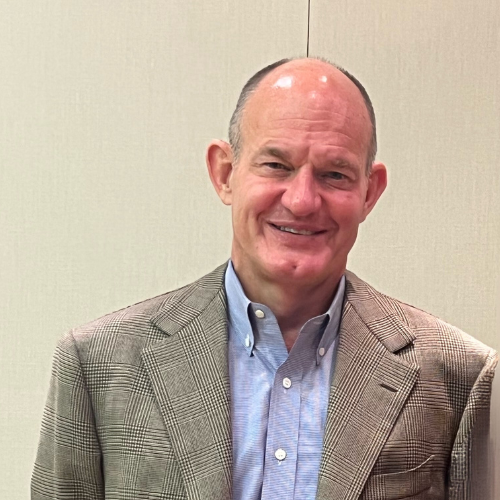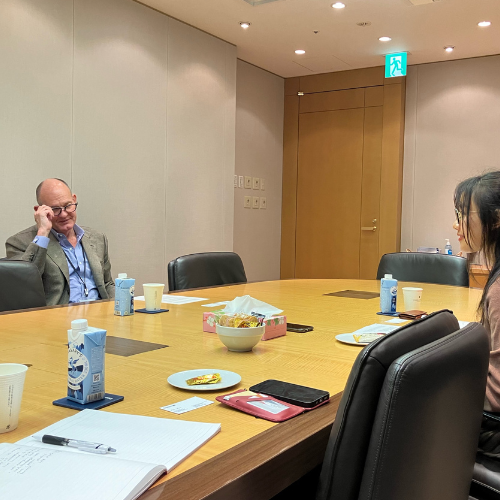Reporter: Ayaka Fukuda (16)
- Growing up in the south as a gay youth
- Why and how LLAN was founded
- The journey towards marriage equality
- What’s going on in Japan?
Today, there are numerous same-sex couples in Japan. Over 300 municipalities have introduced partnership systems for same-sex couples.
However, how do they navigate life in Japan where same-sex marriage is not yet recognized, and what challenges do they face? For insights into this, I conducted an interview with Jon Gray, a partner at the New York-based law firm Davis Polk and a founding board member of the Lawyers for LGBT & Allies Network (LLAN).
Growing up in the south as a gay youth
Before we get down to the main topic, could you tell us about yourself in chronological order?
Jon: I was born and raised in Atlanta, Georgia, which is now a cosmopolitan city, but when I was born in 1968, it was a conservative southern city. In the U.S. south, there was a civil war about 160 years ago over the issue of independence and slavery and after losing the war, the U.S. southern states were generally very poor and tended towards conservative views. Such conservative views continue to this day – including with respect to LGBT issues. So, growing up in the South I knew inherently that being different was something bad and to be ashamed of. In the same way, I sometimes feel that in Japan being different is also bad and shameful. Just like Japanese the proverb, “出る釘は打たれる”*.
I went to high school in Georgia and my family was quite conservative, although loving and stable. If you can imagine the stereotypical large U.S. home with lots of guns, that was where I grew up.
*DERU-KUI-WA-UTARERU/出る杭は打たれる mean, those who are talented or skillful and stand out from the crowd, or those who do extraordinary things, are often hated by others or criticized by others.

During my teenage years, I sensed that I was different, especially when discussing topics about dating and sexuality. However, I couldn’t quite grasp how I was different, particularly during the 70s and 80s when there was limited exposure to no exposure to gay role models in TV, education, and opportunities to connect with other openly gay individuals, particularly youth. I distinctly remember reading about homosexuality in a medical textbook that my parents had at home which portrayed it in a negative light, labeling “homosexuality” as a mental illness.
When the time for college approached, I unconsciously felt it important to move away from the South. I went to Williams College in western Massachusetts, where I started studying Japanese. Even when I graduated from college, I still did not have a clear understanding as to whether I was gay and what that might mean. .
During my college years, I put in a lot of effort, and I landed a job at a Japanese company just as Japan was going through an economic boom. I discovered that grasping how Japanese companies function and navigating social pressures was incredibly beneficial for both my personal and professional growth. I worked hard to improve my Japanese, and I came very close to everyone at the company.
In 1993, I had this moment when I realized “I might be gay.” And I started coming out about my sexuality to close friends. When I came out, the world was struggling with the AIDS epidemic., so I felt that being gay would mean I would always live on the margins of society. Of course, at that time in Japan, it was a society where being gay was not something that people discussed. I knew no one who was gay in Japan. I was lonely and afraid. I decided to leave Japan and applied to Columbia Law School in New York. This was because I perceived that the only choice for a gay-friendly city in the U.S. were NY or San Francisco at that time. As a gay man, I felt I had no choice but to choose a modest way of life on the periphery. . I was born in a time when I had to choose to learn Japanese, live in Japan, and live in New York in order to be inconspicuous. During this time in September 1994, I met Scott who is my partner now and we have been together since then.
Why and how LLAN was founded
You are a board member and co-founder of the Lawyers for LGBT & Allies Network (LLAN), founded in February 2016 by Naosuke Fujita and Alexander Dmitrenko. Could you share with us some episodes related to the launch of your organization?
Jon: In 2015, a loose group met informally at the Netherlands Embassy. At the time, same-sex marriage was just becoming legal in the United States. So, we started to think about what we lawyers could do in Japan.
As a group of lawyers, we thought the most impactful action for Japan was to track same-sex marriage cases globally. We believed legalizing same-sex marriage could fix many issues, so we started by surveying laws in different countries. Surprisingly, countries like South Africa were more advanced in same-sex marriage laws than Japan. This survey became our first group publication, highlighting what we, as lawyers, could contribute.
In recent years, LLAN, in collaboration with the Office of the United Nations High Commissioner for Human Rights (OHCHR), hosted the launch event for the ‘Guiding Principles on Business and Human Rights for Companies on Tackling Discrimination against LGBTI People’ at the United Nations University Headquarters in Japan.”
The journey towards marriage equality
Could you tell us about what it is like in the U.S. where same-sex marriage was legally recognized?
Jon: Thirteen years ago, marrying as a gay man marked a crucial milestone. The New York Times boldly featured gay marriages, and encountering their wedding pages felt surreal – it was a revolutionary moment. Fast forward to 2015, the Supreme Court’s official recognition of same-sex marriages marked a momentous advance in the quest for equality.
So last year, before I got married, we wrote to the New York Times. I thought they might be interested, but they never replied to us! It seems like people don’t really care about it anymore. Whether straight or gay, marriage means marriage in the U.S. now.
What does marriage mean to you?
Jon: It is important. It’s a commitment. As I said this in the speech at the Equalty GALA last year, we structured our lives assuming we could never get married so we created legal documentation to make sure that if I got sick, Scott would have rights to visit me, give everything to him, and to make sure that we were taken care of. So we wondered why the formal step of marriage was necessary after being together for the past 28 years. But what really changed through marriage in my view is our view our commitment, support and compromises.
I think it’s important to discuss the breakage cost of marriage. It sounds negative, but it’s important. Whether gay or straight, part of the marriage vows are for better for worse for richer for poorer.
Because Scott has moved with me globally, \he had to give up his career to help me be successful. It’s fair to give him protection in case our relationship falls apart.
Difficult things happen in life. The marriage vows are for better or worse, richer for poor. Part of marriage is supposed to hold couples together and at the same time. In order to do so, marriage needs to have breakage costs.

What’s going on in Japan?
I heard your marriage celebration is being postponed until same-sex marriage is recognized in Japan. Will there be more discussion of it in Japan?
Jon: I really wanted to have our marriage celebration in Japan. As Evan Wolfson*, the founder and president of Freedom to Marry said in his speech that getting married is part of freedom, both Scott and I want to get married and be blessed here in Japan. Also, I need to make sure that we’re protected by law. When the law is in place, I can bring my family together. It is important for us to do so, while our parents are still alive. I think same-sex marriage is right for Japan. However, I think it needs to be implemented in a way that works for Japanese society. The state of same-sex marriage in Japan must be discussed in a way that is integrated into Japanese society, and that might not be by simply copying other countries. While the outcome should be same, the process by which Japan gets there and builds public support will necessarily be different.
* Evan Wolfson: Evan Wolfson (born February 4, 1957) is an attorney and gay rights advocate. He is the founder of Freedom to Marry, a group favoring same-sex marriage in the United States.
Please tell us about any challenges such that Japan may face to due to its unique culture and society for the realization of same-sex marriage.
Jon: I think this kind of process will take longer than we expected. But when you think about it, when Japan does things, they do it right. Japan is a country that studies the precedents of other countries before doing anything.
So I think the key point here is that Japan considers things carefully. Japan has a unique culture that does not tolerate messy practices, and that is a wonderful thing. It’s part of things that make Japan special, but frustrating at the same time for both the people who live here and outside.
What do you and LLAN members hope to do in the future?
Jon: I think we need to move to the next generation. The majority of those currently serving on LLAN’s Board of Directors are in their 50s or older. We need younger members who have no doubt about their place in society.
In addition, LLAN members are predominantly male, and I think female and/or lesbian members are strongly needed in the future. Having openly gay female members will be a role model for others. It will be a great encouragement to all.
So, we need to focus on what “lawyers” can do for LGBT people. Legal training gives lawyers a special talent to effect change through existing structures and legal organizations. .
Ideally, Japan would be free from LLAN. I imagine a future where marriage equality is universal, making our organization unnecessary. Once this goal is reached, we aim to apply our legal expertise to address other issues, using to our advantage our identity as lawyers.
- Growing up in the south as a gay youth
- Why and how LLAN was founded
- The journey towards marriage equality
- What’s going on in Japan?
REPORTER’S MEMO: The phrase he said “we need to focus on what “lawyers” can do” was very memorable for me.I am also interested in becoming a lawyer in the future, so it was very enjoyable and educational to hear a bit about the real world of lawyers!
MEET THE REPORTER: Hello everyone. I’m Ayaka Fukuda. I am a reporter on gender issues and am currently writing an article on marriage reform in Japan. If you have any interesting information or articles on gender issues in general, please share them with me!
